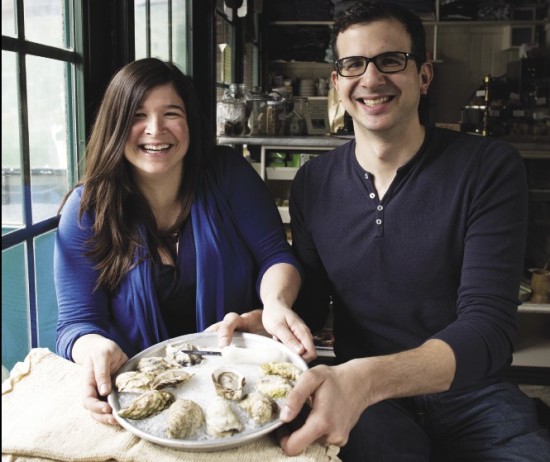If you spend any time with Keith Swenson you’ll swear he’d been raised in waders, shucking fresh Crassostrea since he was big enough to grip a shell. Within minutes of meeting the man—who co-owns Righteous Foods, a Fort Greene–based oyster delivery business with his younger sister, Amy Frey—he’s apt to touch on the demise of Long Island’s Great South Bay oyster (disease from foreign transplants), the proper way to store product (with the curved cup on the bottom, so they don’t drip liquid), the definition of duck footing (the graceful fluting usually seen on Pacific Coast species) and how the Clean Water Act from 1972 affects our New York Harbor. (Aquatic life is finally back, but that’s bad news for our city’s old wooden piers.)
Yet Swenson, it turns out, didn’t come from a long line of oystermen or marine scientists. Rather, he’s a former Wall Street trader raised in Jersey, where his father and uncle ran a shipping company connecting loads of potatoes, shoes or TVs between rail yards, container ships and trucks. Swenson didn’t know much about oysters at all until a college friend from Virginia called him up in 2007 with a proposition. His family owned the Rappahannock River Oyster Company, and they needed somebody to hand-sell their Chesapeake Bay Stingrays, Old Salts and Rappahannocks—already earning raves—to chefs in the city.
“It seemed like a crazy thing to do,” says Swenson, now 37. “I didn’t have a delivery truck. I had no experience selling anything.” But after seven years he was tired of trading, ready to work for himself and hungry for a job where he felt good about what he did—hence the name Righteous Foods. So he quit the Street, bought a refrigerated van and got licensed to distribute, originally working out of space in Ridgewood, Queens. He’d studied biology in school alongside finance, and quickly fell in love with his new industry. “I’m super interested,” he says sincerely, “in the process.”
At first Swenson essentially repped for Rappahannock, whose oysters would arrive shortly after harvest on seafood delivery trucks that make daily trips up and down the East Coast. Ed’s Lobster Bar in Manhattan was an inaugural client, and his next big sale was even better: to the beloved zinc-topped bar at Balthazar, whose existing supplier happened to have troubles making deliveries. Then in January 2008, an article about pairing oysters with red wine at that restaurant appeared in the Times: One of the few varieties that made the cut was Swenson’s sweet and briny Stingray. (It was, wrote Eric Asimov, “great with the funky Arbois.”)
When Swenson’s original partner left, Frey quit the family freight business in Newark and joined her brother schlepping shellfish. Together they grew the distribution company into a full-fledged purveyor known for sourcing uncommon oysters from around the continent—“finding things, people, places that are interesting,” as Frey puts it—to clients like Union Square Café, the Clover Club, Walter Foods, and Marlow & Sons, which after five years now relies on Righteous as their biggest bivalve supplier, ordering up to 1,500 a week.
“I remember being impressed when he came in for a tasting,” recalls Ken Wiss, chef de cuisine at both Marlow and Diner, “he shucked bare-handed—no towel or glove or anything.” Since then, Wiss has grown to appreciate not just Swenson’s shucking abilities, but his skill in finding extremely flavorful specimens and his vast knowledge borne of direct relationships with growers..
Frey, 30, now shares her bother’s love of oyster arcana and still recalls her first taste as a young adult in France. It was the famously scarce, famously strong species called the Belon, also known as a European Flat. “The flavor,” she says with a smile, “was super-unexpected.” Today she sells that same oyster, which is also grown in very tiny quantities on the Northeast and West coasts. (“Complex, expensive and rare,” is how Righteous describes them to clients.)
Their seasonally changing stock also includes salty little La Saint Simons from Shippegan, New Brunswick, which arrive neatly packed in small boxes; bags of cucumbery true Kumamotos and Puget Sound Deer Creeks, both farmed in Washington State; and the Fire Rivers and Little Shems from the Shemogue Oyster Company off Canada’s Northumberland Strait, just north of Nova Scotia. (If you don’t yet know the score on farm-raised shellfish, unlike salmon, it’s a win-win-win: good for the oysterman, the environment and the eater.)
Swenson and Frey’s oysters are harvested to order, meaning the bivalves remain in their oceanic home until they’re summoned by a chef—not only is freshness a factor with live creatures, says Swenson, oysters dislike being jostled. But they do keep a few on hand for emergencies, like Valentine’s Day, when Wiss forgot to order extra. (Swenson delivered them en route to dinner with his fiancée.) Their walk-in cooler—in the back of a nearly empty garage near the Navy Yard—is only a few feet wide. That, a couch and a van pretty much make up the extent of their office equipment. Their business model isn’t that different from their father’s, especially when you consider their own freight comes from the water, across the land and even occasionally by plane—with only a brief stopover at Righteous.
“This,” says Swenson, with a wave of his hand at a few bags of wriggly lipped Kumamotos on a recent Thursday morning, “will pretty much all be gone by tomorrow.”




